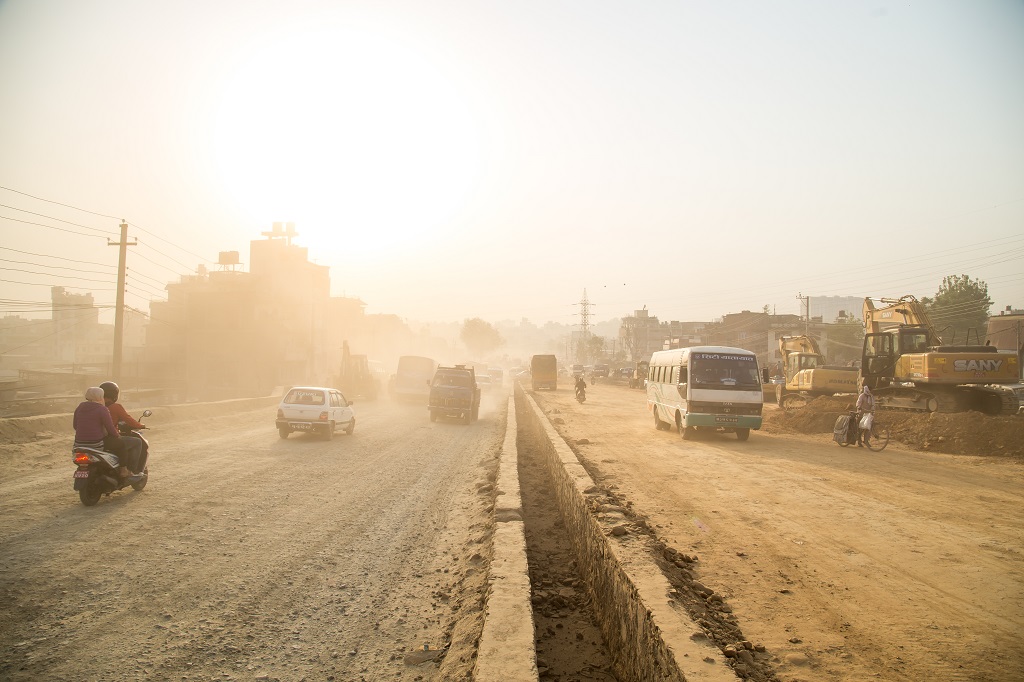Dusty development
Ever wondered how easily the organs so well protected by bones and muscles within the human bodies fall victims to the environment around us? We need to screen the air through masks, visors, or windshields. We need to fight with the visible and invisible impurities. And no, it’s not just the respiratory problems that we suffer from due to air pollution but diseases like cancer and heart diseases too, according to doctors. As I was gathering more knowledge on the health impacts of air pollution during the Air Quality Awareness Week last week, I recalled the time my parents would go on morning walks, from Banasthali to Swoyambhu, without covering their nose or mouth. Walking by the side of Peepal trees, breathing fresh air brought by the hustling of the leaves, listening to cuckoos—they are things I can only dream of now. I live in Syuichatar now, very close to Kalanki where construction of an underpass has taken a toll on our health. For the past two years, passing through the area has been a bit like going through a war zone, where bombs were dropped, messing up the whole area.
Development in recent times in the urban areas of Nepal have been very dirty. In winter, its dust all over the roads; come monsoons, there’s awful lot of mud and slush, and once the skies clear and sun shines, up goes the dust air too, just like fog. Our municipality and the government are strangely wise, who send people with brooms on the roads instead of road cleaning machines.
It’s obvious that those who live closer to construction sites or factories suffer more. Children and elderly who do not have strong immunity fall sick, which reflects in higher rates of hospital attendance, as per doctors and researchers. Still, something as simple as vacuuming the roads, to take care of at least one kind of air pollutant, has never been done and yet we dream of becoming cleaner and greener, maybe Singapore if not Switzerland!
Although our constitution regards clean environment as our “right” and we can be “compensated” if we suffer from unhealthy environment, no one knows how to claim that compensation. Pollution has limited our fundamental rights—our freedom of movement is compromised. Freedom of speech also gets affected when you are walking on the roads that are clouded with dust, not to mention additional spending in medicines, soaps and detergents.
But why isn’t there enough buzz or pressure to demand the right enshrined to us by our constitution? Maybe it’s not sexy enough for politicians. Maybe we are fine covering ourselves. No doubt, roads need to be built and expanded, industries must run, people need to be employed, those who can afford to buy vehicles must be allowed to do so as well. The economy should thrive, not through “dusty development” that is unfair to citizens but with the “duty to protect” people from diseases caused by pollution.
Oh, my Google!
Lately international news agencies have been flooded with reports, criticism and concerns about harvesting personal information on digital platforms, Facebook in particular. Its owner, Mark Zuckerberg, one of the richest people on the planet, was recently grilled by American congressmen over the issue. While Zuckerberg agreed that his company had not done enough to secure data, Facebook, he clarified, does not “sell data to advertisers.” I was once told in the US by an ex-officer of National Security Agency (NSA) that every single Facebook post and Twitter feed was recorded at the Library of Congress. I was shocked. If you go to the Library of Congress (LOC), the official library of the US, you can read about Twitter “donating” its digital archive to LOC. A 2010 press release on its website says, “Today the Library holds more than 167 terabytes of web-based information.” However, in 2017, it limited the number of tweets to be archived and did not record all public tweets.
The NSA person had further said that when you enter certain keywords on search engines like Google, you could be under surveillance. When I told him that I was researching Al Qaeda, he said the place where you do your search also matters. In my case, it was mostly the library of my university, which he said would be relatively safer, perhaps because I wouldn’t be looking for Al Qaeda all the time or even if I did, it would be related to my research. Anyway, that made me realize, what you search on Google or share on social media would be monitored, and that could be considered as evidence if there was a criminal case later. Crowdsourcing!
On Google, you can basically find anything and everything. Whether you want to know about appendicitis, Nepal’s armed conflict, or potty training, you can Google. It has been such a part of life that even my two-year-old son holds my cell phone close to him and says, “Okay Google.” But hey, Google follows you all the time, locating where you went, recording what you bought, what you searched or deleted, keeps information of what apps you use, and it even has an advertisement profile of you. Well, all of these may still be fine if not misused, but who knows?
The times have changed so dramatically in the last 20 years or so that imagining a life without Facebook or Google is almost impossible, almost everywhere in the world. There’s no question that internet brings people closer and provides a plethora of good information. But it is not without risks. There have been reports in Nepal too of cybercrime and police action. In fact, police suggest we do not share status of where we are travelling or what we are doing so that we don’t fall prey to criminal minds. So, next time you post anything on social media or search Google, just be careful. Your searches and posts could be monitored from places unknown. OMG!








